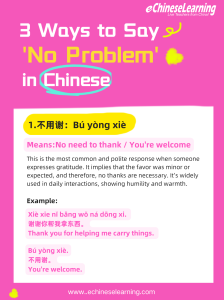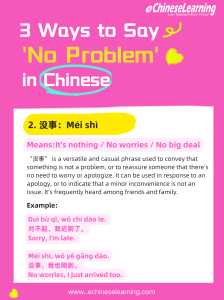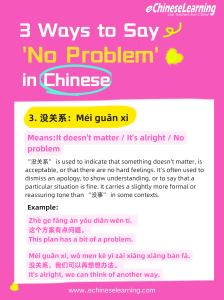1.不用谢:Bú yòng xiè——No need to thank / You’re welcome!
This is the most common and polite response when someone expresses gratitude. It implies that the favor was minor or expected, and therefore, no thanks are necessary. It’s widely used in daily interactions, showing humility and warmth.
Example:
Xiè xie nǐ bāng wǒ ná dōng xi.
谢谢你帮我拿东西。
Thank you for helping me carry things.
Bú yòng xiè.
不用谢。
You’re welcome.
2. 没事:Méi shì——It’s nothing / No worries / No big deal
“没事” is a versatile and casual phrase used to convey that something is not a problem, or to reassure someone that there’s no need to worry or apologize. It can be used in response to an apology, or to indicate that a minor inconvenience is not an issue. It’s frequently heard among friends and family.
Example:
Duì bù qǐ, wǒ chí dào le.
对不起,我迟到了。
Sorry, I’m late.
Méi shì, wǒ yě gāng dào.
没事,我也刚到。
No worries, I just arrived too.
3. 没关系:Méi guān xi——It doesn’t matter / It’s alright / No problem
“没关系” is used to indicate that something doesn’t matter, is acceptable, or that there are no hard feelings. It’s often used to dismiss an apology, to show understanding, or to say that a particular situation is fine. It carries a slightly more formal or reassuring tone than “没事” in some contexts.
Example:
Zhè ge fāng àn yǒu diǎn wèn tí.
这个方案有点问题。
This plan has a bit of a problem.
Méi guān xi, wǒ men kě yǐ zài xiǎng xiǎng bàn fǎ.
没关系,我们可以再想想办法。
It’s alright, we can think of another way.
Mastering these variations will allow you to respond more naturally and appropriately in different social situations, making your Chinese sound more authentic and fluent. Keep practicing and pay attention to how native speakers use them!
Want to learn more practical Chinese phrases? Try your first free 1-on-1 trial class with a live native Chinese teacher today—get personalized speaking practice that actually sticks!






